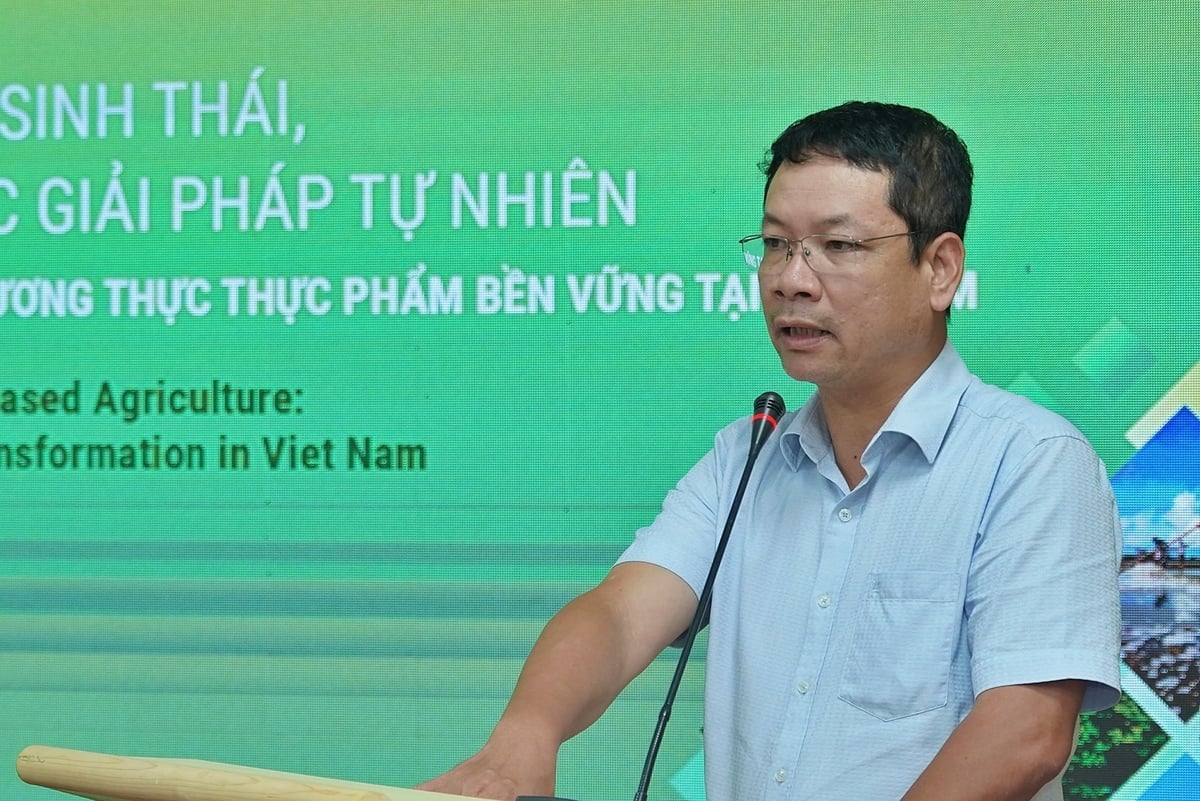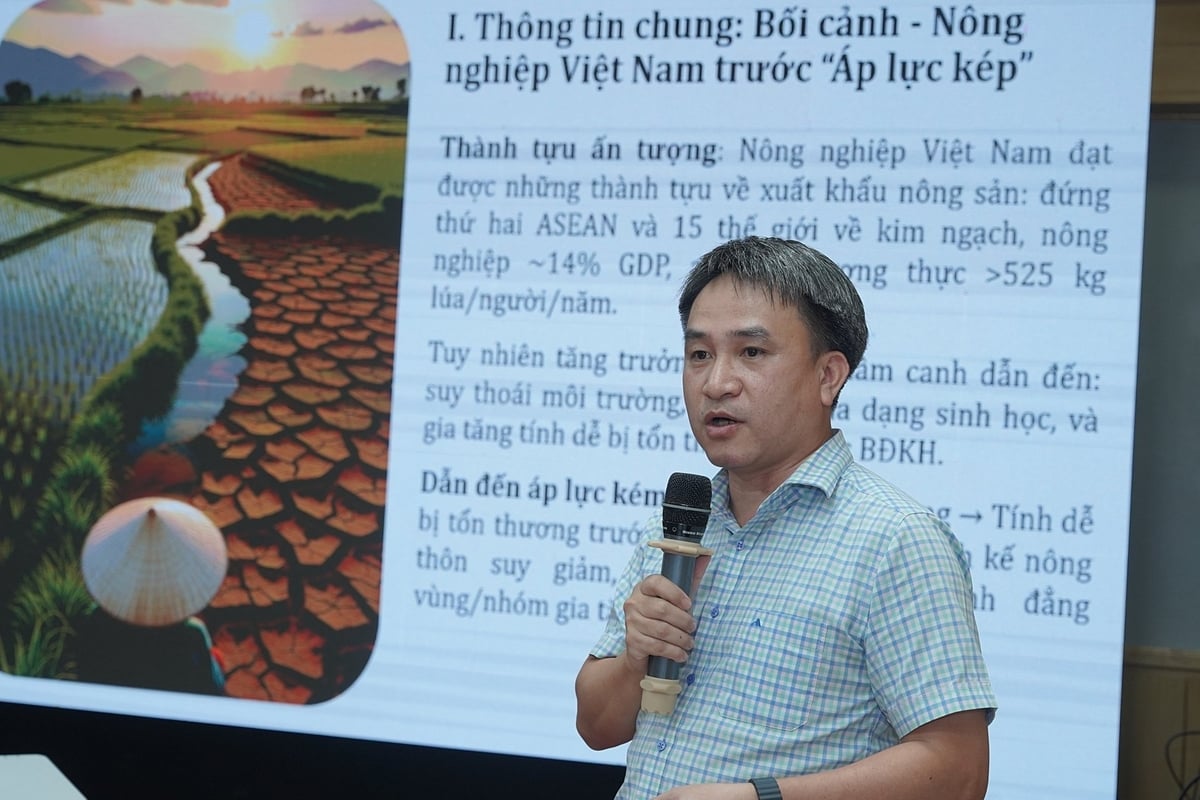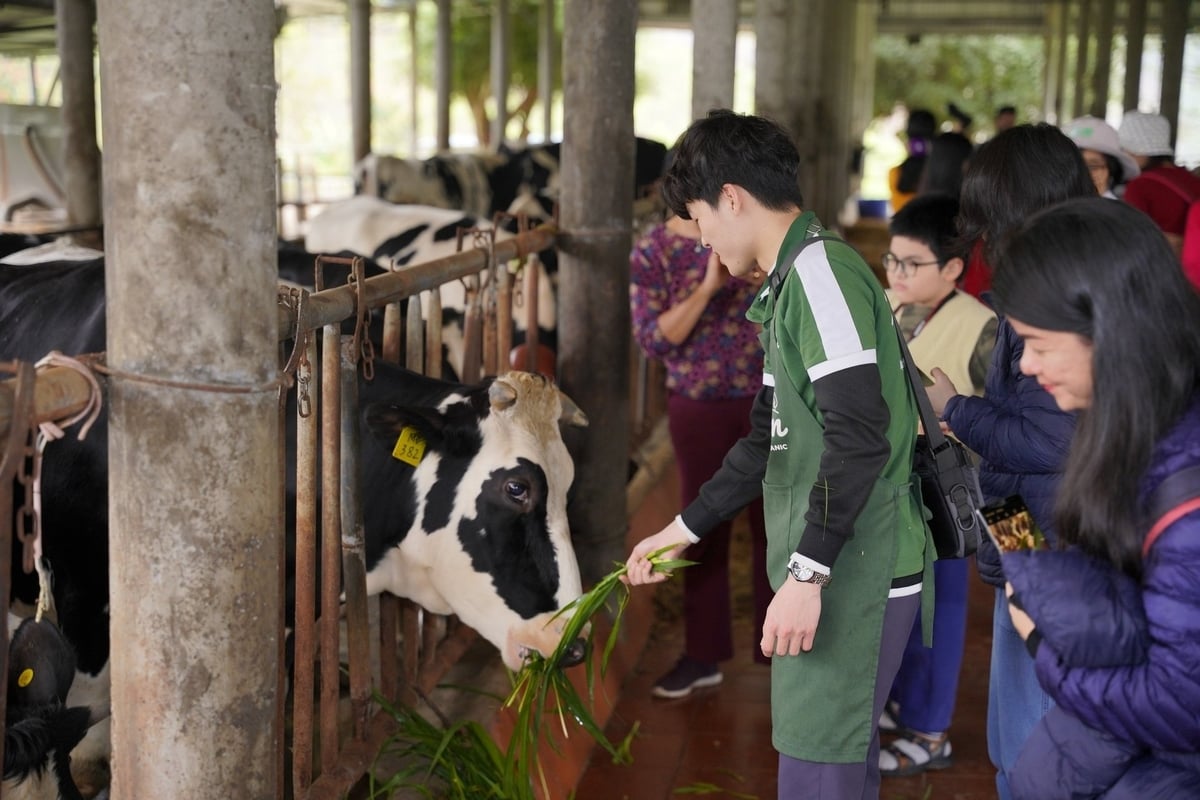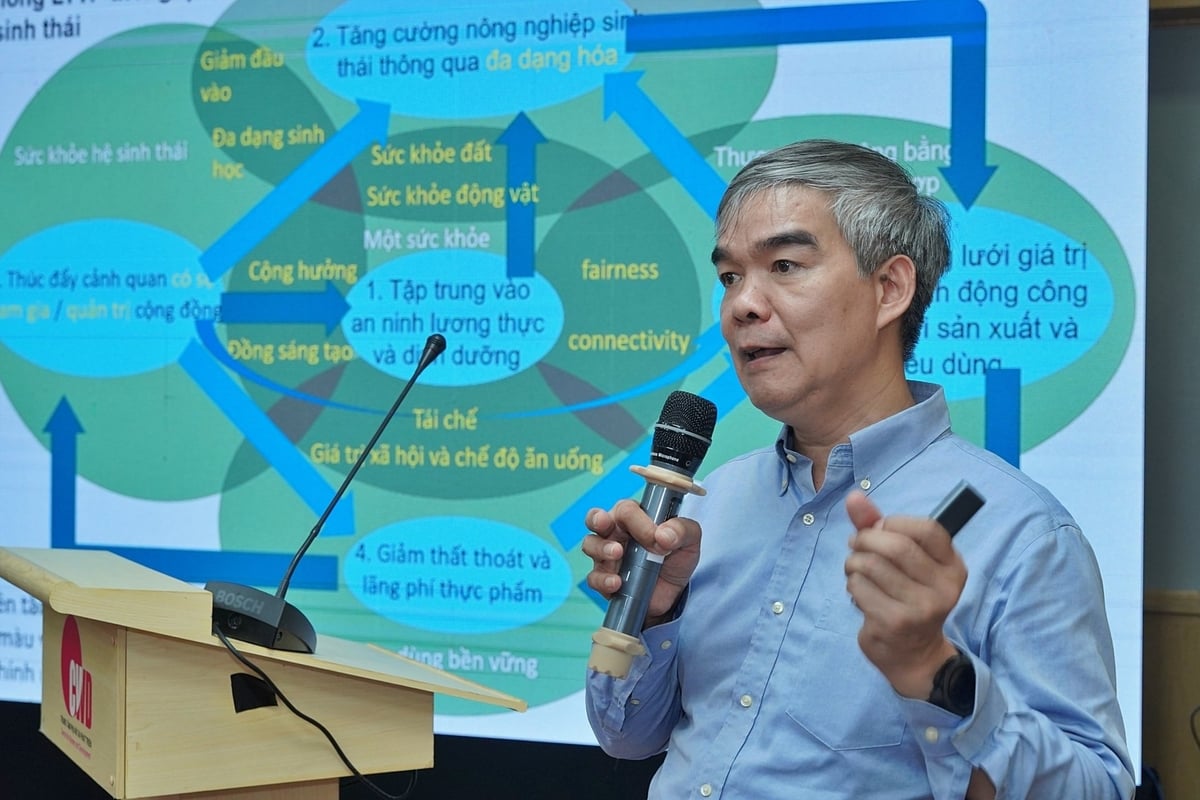December 6, 2025 | 17:53 GMT +7
December 6, 2025 | 17:53 GMT +7
Hotline: 0913.378.918
December 6, 2025 | 17:53 GMT +7
Hotline: 0913.378.918
With over 10 years devoted to organic agriculture, Ms. Nguyen Thi Thinh, CEO of Muc Dong Organic, has chosen the difficult path: transforming farmers' traditional knowledge into a closed circular model aligned with international standards.
"Banks are reluctant to provide unsecured loans due to risks from natural disasters and epidemics. But without insurance, how can farmers and cooperatives dare to boldly go for the ecological path?” Ms. Thinh questioned at the Consultation Workshop on Evaluating Agroecological Models held on August 26.

Deputy General Director ICD Vu Thanh Liem: "Agroecology both protects biodiversity and enhances resilience to climate change." Photo: Bao Thang.
From those concerns, Muc Dong decided to relocate its barns to Hoa Binh in order to reduce capital requirements, where the herd of cows is raised under the philosophy of “five no’s.” Livestock waste is transformed into bio-fertilizer, solar energy replaces grid electricity, and plastic bottles are collected for recycling. These details may seem small on their own, but together they form a closed-loop circular economy.
This cycle not only saves tens of millions of đồng in costs each year, but also creates additional jobs for the community. Muc Dong, therefore, does more than just sell milk. It also sells an inspiring story of a bottom-up ecological approach.
From another perspective of agroecology, Mr. Tran Manh Chien, CEO of Bac Tom Organic Food, highlighted PGS. Unlike third-party certification, which can be costly, PGS is sustained by trust. Farmers, retailers, and consumers together verify and uphold credibility for one another.
From four organic vegetable shops in 2009, the network has now expanded to more than 100 outlets. "Small shops sometimes make big things happen. They are the bridge that keeps the organic market alive," Mr. Chien shared.

Deputy Director Bui Hai Nam presents solutions based on the 'closed value chain' mechanism to promote ecological agriculture. Photo: Bao Thang.
However, both Ms. Thinh and Mr. Chien face the same bottleneck: financing for smallholder farmers is often scarce and short-term, insufficient to sustain long-term ecological models. For this reason, Mr. Vu Thai Truong, Head of Climate Change and Environment at UNDP Vietnam, noted that without green credit and active community participation, agroecology will struggle to achieve sustainability.
Conversely, if financial flows are unlocked and cooperatives are empowered to take ownership, agricultural products can be linked with local tourism and cultural experiences right on their home soil.
This way, farmers themselves can retain the added value instead of letting it slip away. A fruit like the Canarium fruit may become a delicacy when served in a Hanoi restaurant, but if it is introduced and experienced directly in its place of origin, in combination with tourism, its value will endure far more sustainably.
The discussion on green credit and the role of cooperatives opens up a broader perspective at the policy level. According to Mr. Bui Hai Nam, Deputy Director of the National Institute of Agricultural Planning and Projection, if credit and markets are the lifeblood of the system, then policies must serve as the backbone to support it.
The current challenge does not lie in vision but in the gap between vision and the farm field. "We already have policy frameworks and Net Zero commitments, but if farmers do not see tangible benefits, agroecology will remain trapped within pilot projects," he warned.
Mr. Nam argued that the solution lies in a mechanism of “closing the value circuit,” where policy, finance, markets, and farmers operate together as a closed loop. In that scenario, farmers are not just implementers but the very center of transformation. Agroecology would no longer remain a beautiful idea but become a true economic driver, sustaining both livelihoods and a greener future for the nation.

Muc Dong Organic’s dairy farm combined with visitor experiences. Photo: Courtesy of the enterprise.
Agroecology in Vietnam is no longer an experimental option. It has entered the stage of becoming a mandatory standard, tied to the country’s net-zero emissions pledge by 2050 and to national strategies on food systems, multi-value agriculture, and sustainable development.
This direction was affirmed by Mr. Vu Thanh Liem, Deputy General Director of the International Cooperation Department (Ministry of Agriculture and Environment). "Agroecology is both a way to protect biodiversity and the key for agriculture to withstand severe shocks," he said.
According to him, what is crucial now is to define clear criteria for measurement and implementation. Green finance mechanisms, carbon credits, and public-private partnerships will serve as drivers to turn promises into action. In other words, agroecology can move beyond slogans only when linked to concrete financial flows and transparent measurement frameworks.
Adding an international perspective, Dr. Nguyen Quang Tan, Vietnam Country Coordinator of ICRAF, highlighted the 13 principles of agroecology set out by the High Level Panel of Experts on Food Security and Nutrition (HLPE) ranging from production diversification and social equity to circular economy. He emphasized that these principles are not merely a “collection of techniques,” but essential foundations for building fair and sustainable food systems.

Dr. Nguyen Quang Tan shares a five-step approach to transforming food systems through agroecology. Photo: Bao Thang.
Dr. Tan mentioned India, where thousands of extension officers have been trained to spread ecological farming models; about the Philippines, where agriculture combined with green infrastructure has revived sloping lands; and about Indonesia, where peat soils have been saved through agroforestry.
These stories point to a common lesson: when agroecology is embedded into official regulations, millions of farmers can change their practices and secure their livelihoods.
In Vietnam, models implemented by ICRAF in Lao Cai and Phu Tho have shown that chemical fertilizer use can be reduced by up to 70% while yields remain stable. But to ensure such results do not remain mere bright spots in reports, Dr. Tan stressed the need to create space for “farmer-to-farmer training," which he assessed as the most authentic and effective way of spreading knowledge.
If placed within an official policy framework, agroecology could become a standard step-by-step process. Yet for that standard to take root in daily life, Deputy Director Bui Hai Nam cautioned that the gap between resolutions and farm plots is still too wide.
“The biggest paradox today is that policies are thick, but technical know-how is thin,” he explained. The extension system is not flexible enough, logistics remain cumbersome, and on-site technical services are lagging behind, causing many well-regarded models to fall into the pilot trap easily.
Mr. Nam recommended turning policy into concrete services tailored for each region and crop type, while also establishing a system of Measurement - Reporting - Verification (MRV) to assess outcomes. Only when policies are grounded in practice and validated with data can the value chain from international commitments to farmers’ fields truly be closed.
Translated by Kieu Chi
/2025/12/02/2629-3-141849_60.jpg)
(VAN) Based on its large-scale planted forests, several rubber enterprises have proactively conducted greenhouse gas emission inventories in preparation for entering the forest carbon credit market.

(VAN) MAE is leading in developing a national rare earth strategy, which will be submitted to the competent authorities for promulgation in early 2026.
/2025/12/02/4006-4-092040_652.jpg)
(VAN) The model of converting low-efficiency rice land to aquaculture in many localities has helped increase incomes by 5 to 15 times, improve the environment, and form new fisheries economic zones.

(VAN) Funded by ACIAR, Project FST/2020/123 focuses on measures to prevent harmful alien species, thereby protecting forests from invasive threats.

(VAN) The National Assembly's Supervisory Delegation pointed out solutions for the blue economy, circular economy, environmental protection, and technology application for sustainable marine governance.

(VAN) Lao Cai’s forestry sector is stepping into the spotlight with a series of pioneering initiatives in forest management, monitoring, and sustainable development aimed at generating carbon credits.

(VAN) The Provincial Competitiveness and Governance Index (PCGI) is a tool designed to reflect the quality of local governance.